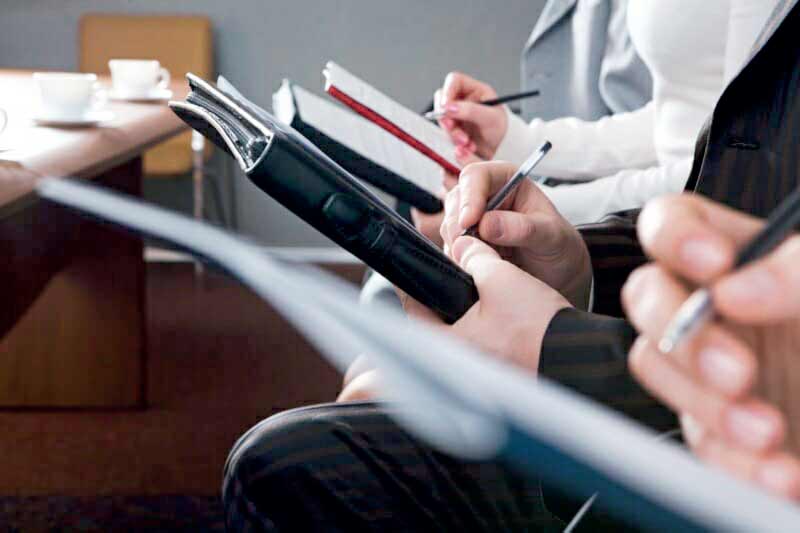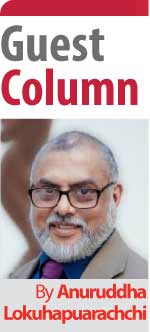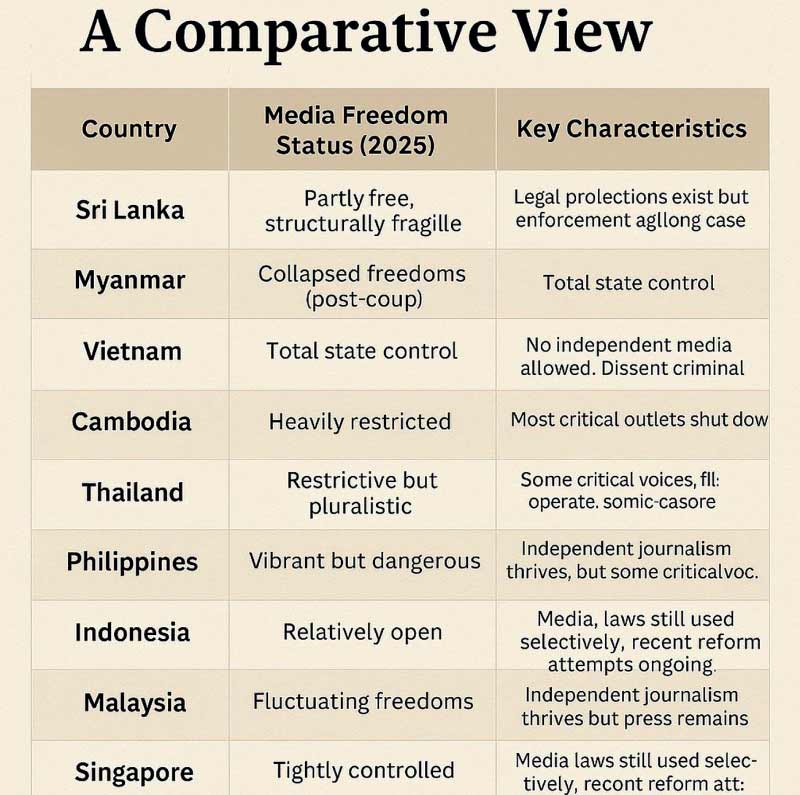Friday Feb 20, 2026
Friday Feb 20, 2026
Friday, 16 May 2025 00:54 - - {{hitsCtrl.values.hits}}

The elements that distinguish professional journalists from casual observers or politically motivated actors are training, ethics, and accountability
 A lively and sometimes heated debate that had been simmering for some time in Sri Lanka’s media community is now unfolding in public: Should a journalist carry an official ID card to carry out their work? My short and clear answer is no. Journalism, by definition, is not a licensed profession. It is a democratic right and civic duty rooted in observation, investigation, and the pursuit of truth. But we cannot deny that this principle becomes more complex when applied in real-world situations—especially when it comes to government premises, high-security zones, or press conferences.
A lively and sometimes heated debate that had been simmering for some time in Sri Lanka’s media community is now unfolding in public: Should a journalist carry an official ID card to carry out their work? My short and clear answer is no. Journalism, by definition, is not a licensed profession. It is a democratic right and civic duty rooted in observation, investigation, and the pursuit of truth. But we cannot deny that this principle becomes more complex when applied in real-world situations—especially when it comes to government premises, high-security zones, or press conferences.
In my understanding, what the Sri Lankan media sector needs is not a license but a structure. Although our media professionals have been striving to build such a framework since the early 1990s, this ongoing debate reveals that we have yet to fully establish it.
Globally, Sri Lanka is still feeling the aftershocks of the digital revolution that has shaken the foundations of the media industry. Smartphones and social platforms have empowered ordinary citizens to tell stories that were once the domain of trained journalists. This democratisation of the media has undeniable value. While we still carry the burdens of a difficult past, citizen media has helped expose injustice, amplify unheard voices, and create new watchdogs beyond institutional control.
But journalism—real journalism—is not merely the act of recording and publishing. The elements that distinguish professional journalists from casual observers or politically motivated actors are training, ethics, and accountability. Institutions must be able to verify who is accessing sensitive places such as the Presidential Secretariat, Parliament, military bases, state ministries, or diplomatic missions. Who is coming? Who do they represent? Why are they there?
In this context, an ID card or press accreditation is not a political restriction—it is a professional safeguard. It ensures that both journalists and institutions operate within a defined, transparent framework, and allows journalism to play a more constructive role in resolving today’s social crises.
The peril of unfiltered citizen journalism: Lessons from Sri Lanka and beyond
At the same time, the unchecked rise of unprofessional “citizen journalism” is having serious consequences for Sri Lankan society.
In recent years, we have witnessed a surge in emotionally charged, poorly sourced, and often politically motivated content flooding social media platforms. Many of these reports—amplified by viral photos or video clips—have fuelled public unrest, ethnic tension, and confusion during moments of national crisis:
But Sri Lanka is not alone in this. A dramatic global example is the 6 January 2021 insurrection at the US Capitol. Misled by so-called “citizen influencers” who shared unverified conspiracy theories and claims of election fraud, thousands of individuals stormed the seat of American democracy. The incident led to deaths, injuries, arrests, and a worldwide crisis of confidence in US democratic institutions. Major social media platforms were forced to ban even elected leaders for inciting violence and spreading falsehoods. Soon after, global discussions on the accountability of citizen media and digital platforms reached the United Nations.
The lesson is clear: freedom of expression without ethical constraints breeds digital anarchy. A smartphone and an internet connection are no substitute for journalistic responsibility. Without fact-checking, editorial standards, and professional recognition, even well-meaning “citizen reporters” can become unwitting agents of chaos.
My experience: The 1996 Central Bank bombing and the value of structure
In 1996, while working for Reuters News Pictures in Colombo, I witnessed the LTTE’s truck bomb attack on the Central Bank. The explosion devastated lives and infrastructure—and it severed Sri Lanka’s communication lines with the outside world.
It was trained, accredited journalists—working with international agencies and official channels—who helped restore the country’s media lifeline. Had there been no professional structure, no formal communication protocols, and no trust between the press and the authorities, the world would have remained blind to what happened that day.
That experience taught me an enduring truth: freedom without preparation is not freedom—it is a risk.
Recognition is not repression
It is a mistake to interpret professional recognition as repression. Some argue that press credentials are tools of control. But that argument only holds if credentials are used unfairly, selectively, or politically.
In a functioning democracy, press accreditation is a safeguard:
Countries with robust media traditions—like the UK, United States, France, and India—maintain accreditation systems for media access to government events. The key is transparency. Accreditation should never be based on political allegiance or personal connections. It must be open to any qualified journalist, regardless of outlet or editorial stance, and should be administered by independent media bodies, not government ministries.
 Sri Lanka in the Southeast Asian context: A comparative view
Sri Lanka in the Southeast Asian context: A comparative view
When we compare Sri Lanka’s media environment with that of its Southeast Asian neighbors, the picture becomes clearer—and more urgent.
Sri Lanka today enjoys more press freedom than authoritarian regimes like Myanmar, Vietnam, or Cambodia, where state control is near-total and dissent is criminalised. However, we still lag behind countries like Indonesia and, in some aspects, even the Philippines, where vibrant press communities function despite threats.
Figure 1 presents a brief comparison.
Sri Lanka, though relatively freer today, must not remain complacent. The democratic opening under the current government offers a rare opportunity to institutionalise freedom and support responsible journalism.
The future: Digital journalism and responsible reform
In my forthcoming book “A History of Global Photo Communication – Through Sri Lankan Experiences”, I reflect on how photo-based storytelling has evolved—from prehistoric cave art to algorithm-enhanced digital media. The forces that have always shaped this evolution are technology and truth—sometimes working together, often in tension.
We cannot and should not stop the digital wave. But we can build systems to support responsible digital journalism, including:
Final thoughts: The bridge, not the barrier
A journalist does not need an ID card to feel like a journalist. But to enter the Presidential Secretariat, the Supreme Court, or the Ministry of Defence as a journalist—or to gain special access in times of crisis—professional recognition is essential.
The press ID is not an obstacle to the truth—it is a bridge between institutions and the people who question them. It should not be seen as a wall, but as a structure that enables both access and accountability.
Unfiltered citizen media has already misled, divided, and destabilised our society. The answer is not censorship—but clarity. We must elevate professional journalism, protect it through fair systems, and educate the public to trust what is real.
I have stood on both sides of the lens—behind riot shields and inside Government boardrooms. And I say this with confidence: the future of journalism in Sri Lanka depends not only on freedom—but on the structures that preserve and protect it.
(The writer is Director, Foreign Media and Strategic Communications – Presidential Media Division, former Reuters Photojournalist, 1992–2009, and author of the forthcoming book “Global Photo Communication – Through Sri Lankan Experiences”.)